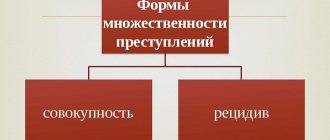ST 68 of the Criminal Code of the Russian Federation.
1. When assigning punishment for a recidivism, dangerous recidivism or especially dangerous recidivism of crimes, the nature and degree of public danger of previously committed crimes, the circumstances due to which the corrective effect of the previous punishment turned out to be insufficient, as well as the nature and degree of public danger of newly committed crimes are taken into account.
2. The term of punishment for any type of recidivism of crimes cannot be less than one third of the maximum term of the most severe type of punishment provided for the crime committed, but within the sanction of the relevant article of the Special Part of this Code.
3. In case of any type of recidivism of crimes, if the court has established mitigating circumstances provided for in Article 61 of this Code, the term of punishment may be assigned less than one third of the maximum term of the most severe type of punishment provided for the crime committed, but within the sanction of the relevant article of the Special Part of this Code Code, and in the presence of exceptional circumstances provided for in Article 64 of this Code, a more lenient punishment than provided for this crime may be imposed.
Commentary to Art. 68 Criminal Code
1. Intensification of punishment in case of recidivism of crimes is as follows: in case of any type of recidivism of crimes, the court is obliged to increase the lower limit of the main type of punishment provided for in the sanction of the article of the Special Part of the Criminal Code to one third of its upper limit and be guided by these limits when assigning punishment. For example, the sanction of Part 2 of Art. 282 of the Criminal Code of the Russian Federation provides for punishment in the form of imprisonment from two months to 5 years. In case of recidivism of crimes, the imposed punishment cannot be less than 1 year and 8 months of imprisonment.
2. If, when calculating one third, a lower limit is obtained that is lower than that provided for in the sanction of the article, then the court will be guided by the term (size) of the punishment established by the sanction of the article, and not the received lower limit. For example, Art. 275 of the Criminal Code provides for a sanction of 12 to 20 years in prison; one third is 6 years and 8 months, in which case the court is obliged to impose a sentence ranging from 12 to 20 years.
3. In the alternative sanctions of the articles of the Special Part of the Criminal Code, the rule for imposing punishment for recidivism of crimes requires the court to choose the most severe of the provided types of punishment. In sanctions with additional types of punishment, the lower limit of the additional type of punishment should not be increased by one third.
4. If mitigating circumstances are established (Part 1 of Article 61 of the Criminal Code of the Russian Federation), then the court may not apply the rule of Part 2 of Art. 68 of the Criminal Code and impose punishment within the limits established by the sanction of the article.
If exceptional mitigating circumstances are established, then the court is obliged not to comply with the requirements of Part 2 of Art. 68 of the Criminal Code and can mitigate the punishment according to the rules of Art. 64 of the Criminal Code.
Second commentary to Art. 68 of the Criminal Code of the Russian Federation
1. Recidivism of crimes, in accordance with Part 1 of Art. 18 of the Criminal Code, occurs when an intentional crime is committed by a person who has a criminal record for a previously committed intentional crime. The repetition of criminal behavior by a person to whom the sanctions of the criminal law have already been applied shows, as a rule, that the previous punishment did not achieve its goals and in order for the new criminal legal impact on him to be more effective, a more severe punishment is required compared to that , which could be applied to a person who has not previously committed a crime.
2. The court is obliged to make sure that there is a relapse in this case: the person’s previous convictions were not legally vacated or expunged; convictions for crimes committed by a person under the age of eighteen were not taken into account when recognizing a recidivism. As for the stages of crimes committed by a person, as well as his role in group crimes for which he was previously prosecuted, these issues do not affect the fact of recognition of recidivism (clause 46 of the 2015 PPVS).
3. The presence of a conviction for a crime of minor gravity in a person who has committed a serious crime does not constitute a recidivism of crimes. However, the commission of an intentional crime of minor gravity by a person who has a conviction for a crime of medium gravity, a serious or especially serious crime constitutes a recidivism of crimes.
Removed, including in the manner established by Part 1 of Art. 74 of the Criminal Code, or a criminal record expunged before the commission of a new crime does not constitute a recidivism. However, the presence of a criminal record (with the exception of convictions listed in Part 4 of Article 18 of the Criminal Code), removed or expunged after the commission of a new crime in the manner established by Art. 86 of the Criminal Code, forms a relapse of crimes, since the presence of a relapse of crimes is established at the time of the commission of the crime (clause 44 of the 2015 PPVS).
4. In accordance with Part 1 of Art. 68 of the Criminal Code, when assigning punishment for a recidivism, dangerous recidivism or especially dangerous recidivism of crimes, the nature and degree of public danger of previously committed crimes, the circumstances due to which the corrective effect of the previous punishment turned out to be insufficient, as well as the nature and degree of public danger of newly committed crimes are taken into account.
5. The rule for increasing punishment in case of recidivism is that:
1) only the most severe type of punishment from among those provided for by the sanction can be imposed;
2) the law (Part 2 of Article 67 of the Criminal Code) establishes its minimum limit.
The term of punishment for any type of recidivism of crimes cannot be less than one third of the maximum term of the most severe type of punishment provided for the crime committed, but within the sanction of the relevant article of the Special Part of the Criminal Code.
6. However, from the above rule, the legislator (Part 3 of Article 68 of the Criminal Code) makes two exceptions that allow the court to overcome the limitation of the minimum punishment by one third of the most severe punishment:
1) if the court has established mitigating circumstances provided for in Art. 61 of the Criminal Code, the term of punishment may be assigned less than one third of the maximum term of the most severe type of punishment provided for the crime committed, but within the sanction of the relevant article of the Special Part of the Criminal Code;
2) in the presence of exceptional circumstances provided for in Art. 64 of the Criminal Code, a more lenient punishment may be imposed than provided for this crime. The court must motivate its decision not to apply the rules of Part 2 of Art. 68 of the Criminal Code in the descriptive part of the verdict.
7. Based on the provisions of parts 2 and 3 of Art. 68 of the Criminal Code, punishment for recidivism of crimes cannot be lower than the lower limit of the sanction of the corresponding article, even if one third of the maximum term of the most severe type of punishment provided for a completed crime is less than the minimum amount of the most severe type of punishment provided for a specific crime (for example, for a crime under Part 3 of Article 161 of the Criminal Code, taking into account the provisions of Part 2 of Article 68 of the Criminal Code, less than 6 years of imprisonment cannot be imposed - the lowest limit of this type of punishment for this crime, although one third of the maximum punishment for this crime is 4 years).
Courts should keep in mind that in case of any type of recidivism of crimes, the sentence for an unfinished crime may be lower than the lower limit of the sanction of the corresponding article of the Special Part of the Criminal Code. At the same time, the reference to Art. 64 of the Criminal Code is not required.
In the case where one third exceeds the minimum amount of the most severe type of punishment provided for the crime committed, the court, in accordance with Part 3 of Art. 68 of the Criminal Code may impose a punishment for a period of less than one third, but not lower than the lower limit of the sanction of the corresponding article of the Special Part of the Criminal Code, if it establishes mitigating circumstances provided for in Art. 61 CC. At the same time, circumstances recognized as such in accordance with Part 2 of Art. 61 CC.
If the size of one third of the maximum term of the most severe type of punishment coincides with the lower limit of the sanction of the corresponding article and the court has established mitigating circumstances provided for in Art. 61 of the Criminal Code, and the grounds for applying Art. 64 of the Criminal Code are not established, the court does not have the right to assign a sentence to a convicted person below the lower limit of the sanction of the relevant article (clause 48 of the PPVS 2015).
8. In the case of consideration of a criminal case in a special manner, in accordance with Chapter. 40 or 40.1 of the Code of Criminal Procedure, for any type of relapse provided for in parts 2 and 3 of Art. 68 of the Criminal Code one third is calculated:
1) for a completed crime - from the maximum term of the most severe type of punishment provided for the crime committed by the sanction of the relevant article;
2) for an unfinished crime - from the maximum term of the most severe type of punishment provided for the committed crime, which can be assigned taking into account the provisions of Art. 66 of the Criminal Code (clause 49 of the PPVS 2015).
Everything about criminal cases
Go to the Criminal Code
Url Additional information:
Punishment for relapse
- Part 1 68 of the Criminal Code
the nature of the public danger is taken into account
- Part 1 68 of the Criminal Code
the degree of public danger is taken into account
- Part 1 68 of the Criminal Code
the reasons for the ineffectiveness of punishment are taken into account
Deadline for relapse
- Part 2 68 Criminal Code
for any type of relapse, the period is at least 1/3
Neutralizing the effect of relapse
- Part 3 68 Criminal Code
the effect of relapse can be reduced with the help of
64 Criminal Code
- Part 3 68 Criminal Code
situation if 1/3 of the maximum is more than the minimum sanction
- Part 3 68 Criminal Code
if there are circumstances
64 of the Criminal Code
there may be another type of punishment
PLENAMA OF THE Supreme Court
- paragraph 44
Plenum No. 58 taking into account recidivism when sentencing
— clause 13
Plenum No. 9, taking into account recidivism when assigning a type of institution
— clause 14
Plenum No. 60 accounting for relapse under a special procedure
Assignment of punishment for relapse
How is it prescribed?
punishment if there is a relapse, two consequences
ERROR in the verdict
Relapse accounting
with an error, contrary to
Part 4 18 of the Criminal Code
in the introductory part of the sentence
Article 68 of the Criminal Code. Assignment of punishment for recidivism of crimes
Url Additional information:
- paragraph 44
Plenum No. 58 rules for determining the presence of relapse
— clause 13
Plenum No. 9, an indication of relapse in the sentence is mandatory
1) When assigning punishment for a relapse, dangerous recidivism or especially dangerous recidivism of crimes, previously committed as well as newly committed crimes are taken into account, namely:
Url Additional information:
— clause 1
Plenum No. 58 the nature of the hazard depends on the characteristics of the composition
Nature of the danger
The nature of public
dangers: consideration in sentencing
—
the nature of their public danger ,
Url Additional information:
— clause 1
Plenum No. 58 degree of danger: consequences, method, type of intent, role
Danger level
Degree of public
dangers: consideration in sentencing
-
the degree of their social danger ,
- the circumstances due to which the corrective effect of the previous punishment was insufficient.
Url Additional information:
- Part 5 18 Criminal Code
more severe punishment for repeat offenders
— clause "a" part 1 63 of the Criminal Code
relapse is an aggravating circumstance
- clause "c" part 1 73 of the Criminal Code
if the relapse is dangerous, then probation is not assigned
- P.
Plenum No. 1 undesirability of a suspended sentence in case of relapse
- paragraph 47
Plenum No. 58 features of sentencing for recidivism
2) The term of punishment for any type of recidivism
Url Additional information:
Preparation
- paragraph 34
Plenum No. 58 1/3 when preparing is counted from
Part 2 66 of the Criminal Code
Assault
- paragraph 34
Plenum No. 58 1/3 in case of attempt is counted from
Part 3 66 of the Criminal Code
Special procedure
— clause 14
Plenum No. 60 unfinished - relapse, 1/3 is calculated after taking into account
66 of the Criminal Code
cannot be less than 1/3 of the maximum term of the most severe type of punishment provided for the crime committed, but within the sanction of the relevant article of the Criminal Code.
3) In case of any type of recidivism of crimes,
Url Additional information:
- paragraph 48
Plenum No. 58 can take into account any mitigating factors (including those from
Part 2 61 of the Criminal Code
)
Emollient
Neutralization of relapse
with the help of mitigating circumstances (
Part 3 68 of the Criminal Code
)
Probation
Conditional sentence
in case of relapse it is quite possible if the relapse is simple
SITUATIONS from practice
Probation
in case of relapse, is it possible, how can norm
64 of the Criminal Code
?
- if the court establishes mitigating circumstances provided for in Article 61 of the Criminal Code, the term of punishment may be assigned less than 1/3 of the maximum term of the most severe type of punishment, but within the sanction of the relevant article;
- and in the presence of exceptional circumstances, provided for in Article 64 of the Criminal Code, a more lenient punishment than provided for this crime may be imposed.
A comment
| Formulations in Part 3 This article is so difficult to understand that a special comment is required. Section 48 will help us figure it out. Plenum No. 58, which also stipulates nuances that are silent in the text of To express the whole point as briefly as possible: the minimum threshold of punishment is “iron” and under no circumstances can the term be less than this threshold. For those who want to understand all the intricacies at a professional level, special material is here: Features of the purpose punishment for relapse. |
Return to the Criminal Code
Seek advice
Third commentary to Article 68 of the Criminal Code of the Russian Federation
1. The commented article reveals the procedure for assigning punishment in case of relapse, dangerous relapse and especially dangerous recidivism (the concept of these types of relapse is given in Article 18 of the Criminal Code), and also lists (in part 1) the circumstances that should be taken into account when assigning punishment in case of relapse.
2. The presence of any type of recidivism in accordance with the principle of justice (Article 6 of the Criminal Code) entails increased punishment in the form of increasing the minimum limit of the imposed punishment: the term of punishment cannot be less than one third of the term of the most severe type of punishment provided for the crime committed. If one third is less than the minimum amount of the most severe type of punishment provided for a specific crime, then the punishment must be imposed not lower than the minimum amount of this type of punishment provided for by the General Part of the Criminal Code. If the crime committed is unfinished, then in the event of a relapse, when determining the maximum term of the most severe punishment, one should proceed from the maximum term of punishment that can be assigned taking into account the requirements of Article 66 of the Criminal Code.
3. The reform of criminal legislation in 2003 strengthened the humanistic principles of criminal legislation. Part 3 of the commented article establishes special circumstances, according to which for any type of recidivism of crimes, a punishment of less than one third of the maximum amount can be imposed. This is possible if mitigating circumstances are established. Moreover, the presence of exceptional circumstances gives the court the right to impose a sentence below the lower limit. This decision of the legislator, in our opinion, does not fully comply with the principles of fairness and differentiation of responsibility.
4. If a person is found guilty of committing several crimes for any type of recidivism, the punishment for each of them must be imposed based on the rules established by the commented article, and for a set of crimes or a set of sentences - in accordance with Article 69 or Article 70 of the Criminal Code.
‹ Article 67. Imposition of punishment for a crime committed in complicityUp Article 69. Imposition of punishment for a combination of crimes ›
Assignment of punishment for recidivism of crimes (Article 68 of the Criminal Code)
Article 18 of the Criminal Code, which explains the concept and types of recidivism, contains the provision that recidivism of crimes entails a more severe punishment on the basis and within the limits provided for by the Criminal Code. Article 68 of the Criminal Code, dedicated to sentencing for repeat crimes, establishes these grounds and limits.
Part 1 of this article provides a list of circumstances that the court must take into account when assigning punishment for any type of recidivism. These include: 1) the nature and degree of public danger of crimes previously committed by this person; 2) circumstances due to which the corrective effect of the previous punishment turned out to be insufficient; 3) the nature and degree of public danger of newly committed crimes. These circumstances make it possible to individualize the punishment, taking into account all the data about the crimes committed and the identity of the perpetrator who committed the crime upon relapse.
Taking into account the nature and degree of public danger of previously and newly committed crimes , as well as the time gap between them, is necessary to identify the defendant’s stable antisocial attitudes, his predisposition to commit the same type (selfish, violent, selfishly violent) crimes, i.e. to characterize his personality. When imposing a sentence, the court must make sure that the person’s criminal record has not been expunged or legally expunged.
Determining the circumstances (reasons) due to which the previous punishment did not have a sufficient corrective effect is necessary to establish the persistence of the defendant’s antisocial aspirations, predict his behavior in the future and determine the sufficiency of the chosen punishment as a means of achieving his goals (correction, prevention of new crimes and restoration of social justice). This also characterizes the personality of the culprit from a negative side.
Recidivism of crimes is an indicator of a significant increase in the danger not only of the perpetrator’s personality, but also of each subsequent crime, in the methods and circumstances of which the base goals, motives and personal traits of the repeat offender are manifested.
Part 2 of Article 68 of the Criminal Code of the Russian Federation establishes that the term of punishment for any recidivism of crimes cannot be less than one third of the maximum term of the most severe type of punishment provided for the crime committed, but within the sanction of the corresponding article of the Special Part of the Criminal Code. For example, in the event of a dangerous relapse of crimes for committing a crime provided for in Part 4 of Article 158 of the Criminal Code of the Russian Federation, the punishment for the convicted person can be assigned to at least three years and four months of imprisonment (1/3 of 10 years). The requirement for a mandatory minimum sentence is due to the fact that it concerns the punishment of persons who, despite previous convictions for intentional crimes, do not take the path of correction and again commit intentional crimes.
One third of the maximum penalty established by law for a given crime may be less than the minimum limit of this penalty established by the sanction. For example, a terrorist act (Part 1 of Article 205 of the Criminal Code) is punishable by imprisonment for a term of 8 to 15 years. One third of the maximum sentence is 5 years, which is significantly less than the minimum penalty for this crime. In relation to such cases, the Plenum of the Supreme Court of the Russian Federation, in Resolution No. 2 of January 11, 2007, proposed a solution that is fundamentally erroneous and contradicts not only the letter of the law, but also the principle of justice.
Paragraph 16 of the Resolution states: “If one third is less than the minimum amount of the most severe type of punishment provided for a specific crime, then the punishment must be imposed not lower than the minimum amount of this type of punishment provided for by the General Part of the Criminal Code of the Russian Federation.”
If you follow the stated recommendation of the Plenum of the Supreme Court of the Russian Federation, then for a terrorist act under Part 1 of Article 205 of the Criminal Code (sanction - from 8 to 15 years of imprisonment) in the event of a relapse (even dangerous or especially dangerous), punishment can be imposed within two months up to 15 years of imprisonment, while in the absence of recidivism and mitigating circumstances - from 8 to 15 years. This situation contradicts the principle of justice. It seems that in this case the punishment should be imposed within the sanction of the relevant article of the Special Part of the Criminal Code of the Russian Federation.
In case of recidivism of crimes, only the most severe type of punishment provided for by the sanction is imposed; other types of punishments provided for by the sanction cannot be imposed.
If a person has committed one or more crimes as a repeat, dangerous or especially dangerous recidivist, then the punishment for each of them is assigned based on the rules enshrined in Article 68 of the Criminal Code, after which the final punishment is imposed for the totality of crimes or the totality of sentences in accordance with Art. Art. 69 or 70 of the Criminal Code, if there are no grounds for its non-application due to part three of the same article.
If, upon relapse of crimes, a person commits an unfinished crime, then the punishment for preparation for it cannot be less than one-third of one-half, and for an attempt on it - less than one-third of three-quarters of the maximum term or amount of the most severe type of punishment established by the sanction of the relevant article of the Criminal Code .
Part 3 of Article 68 of the Criminal Code of the Russian Federation provides for two exceptions to the rule enshrined in Part 2 of Article 68 of the Criminal Code, in the presence of which the punishment for recidivism of crimes can be imposed within lesser limits, i.e. less than one third of the maximum term of the most severe type of punishment provided for the crime committed, namely:
1) establishment by the court of mitigating circumstances provided for in Article 61 of the Criminal Code, under which the term or amount of punishment may be assigned less than one third of the maximum sanction, but within the limits of the relevant article of the Special Part of the Criminal Code of the Russian Federation;
2) the presence of exceptional circumstances provided for in Article 64 of the Criminal Code, under which a more lenient punishment may be imposed than provided for this crime.
The rules of Parts 2 and 3 of Article 68 of the Criminal Code of the Russian Federation are aimed at humanizing the punishments imposed for repeat crimes, especially when mitigating circumstances are identified.




